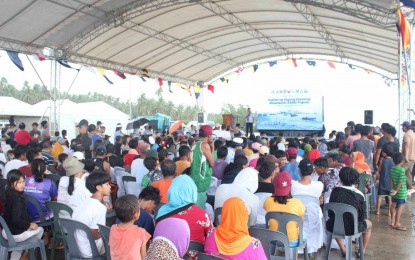MANILA – The Bureau of Fisheries and Aquatic Resources (BFAR) is set to launch a “food boat” to further support the livelihood of Filipino fishers in the West Philippine Sea (WPS).
The food boat will provide both logistics support and direct market linkage, in line with President Ferdinand R. Marcos Jr.’s directives to boost local productivity and help Filipino fishers in the country.
The vessel will resemble the function of the newly launched joint project with the Philippine Coast Guard (PCG) dubbed “Kadiwa ng Bagong Bayaning Magsasaka (KBBM)” program in Palawan.
In a phone interview on Thursday, BFAR spokesperson Nazario Briguera said over PHP20 million worth of food boats will be made available to Filipino fishers by the end of the year or in early 2026.
“May barko ang BFAR na pupunta doon sa laot at may kakayahan ito na magsagawa rin ng mga yelo on board, iyong mga slurry ice para mas ma-preserve iyong huli ng ating mga mangingisda (The BFAR’s food boat will sail to the sea and it has a capacity to provide ice on board, the slurry ice to preserve the catch of our fishers),” he told the Philippine News Agency.
“Ito rin ang magiging logistic support doon sa mga mangingisda sa pamamagitan ng pagdala sa merkado ng kanilang mga huli (This will also serve as a logistic support to fishers by delivering their fresh catch from sea to markets).”
The food boat has a carrying capacity of 20 metric tons (MT) each week, which would be helpful to Filipino fishing vessels, particularly during peak fishing season.
KBBM program
The newly launched KBBM, meanwhile, will benefit nearly 1,000 fishers in the WPS as it covers operational costs, provides fuel and ice subsidies, and market linkage.
Briguera said the KBBM, through the PCG’s MV Mamalakaya, will transport fishers’ fresh catch from the sea to major ports of Zambales, Navotas, and nearby areas of the WPS fishing grounds.
He said this is the first time that the government is implementing such a strategy to boost the livelihood of Filipino fishers and help reduce post-harvest losses.
“Ang advantage po nito, mababawasan iyong operational cost ng ating mga mangingisda dahil hindi na kinakailangan na bumalik na kaagad sila sa pampang para madala ang kanilang mga huli (Its advantage is it will reduce the operational costs of our fishers because they don’t have to go back immediately to the shore to deliver their catch),” he said.
“Kundi doon sa pamamagitan ng barko ng PCG ay mismo bibilihin na yung kanilang mga huli (Instead, through the PCG vessel, their produce may be bought already).”
The BFAR official said the WPS production accounts for 13 percent of the country’s total annual production on average.
The Department of Agriculture (DA), meanwhile, said the KBBM will be implemented in three phases until 2027.
These include Kalayaan Group of Islands for the first phase; Bajo de Masinloc for Phase 2 in 2026; and portions of Northern Luzon, particularly in the Benham Rise in 2027 for the last phase. (PNA)


